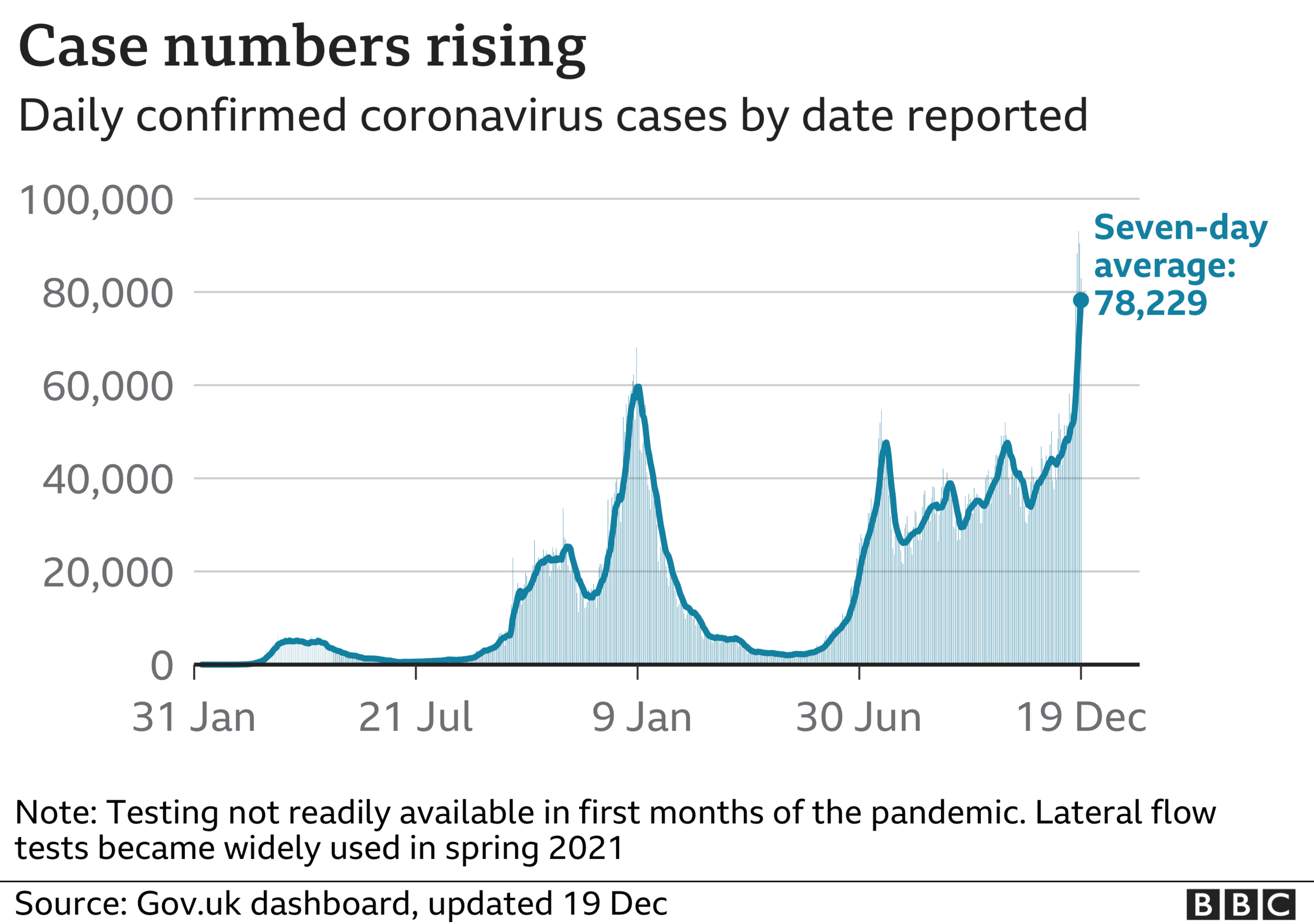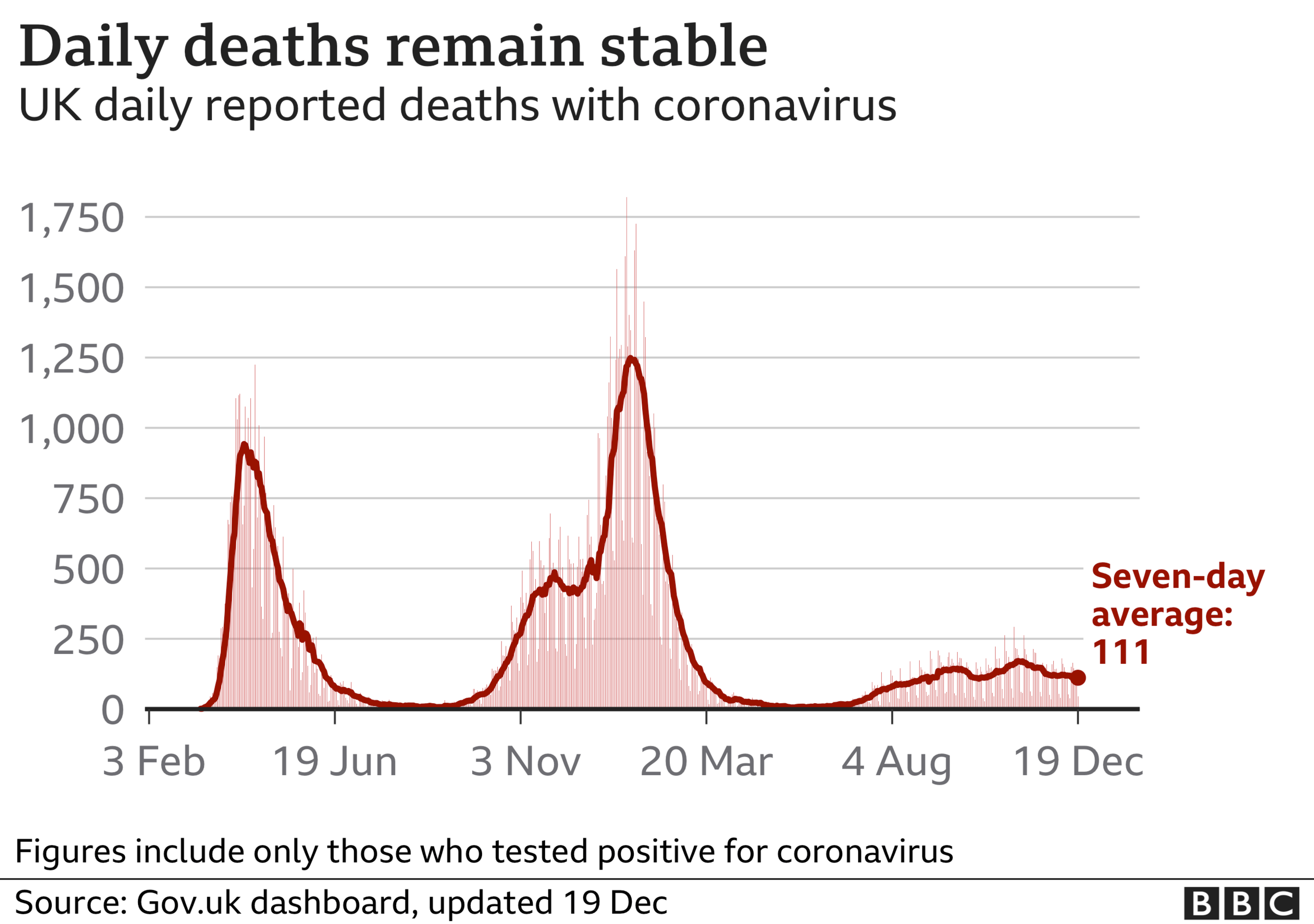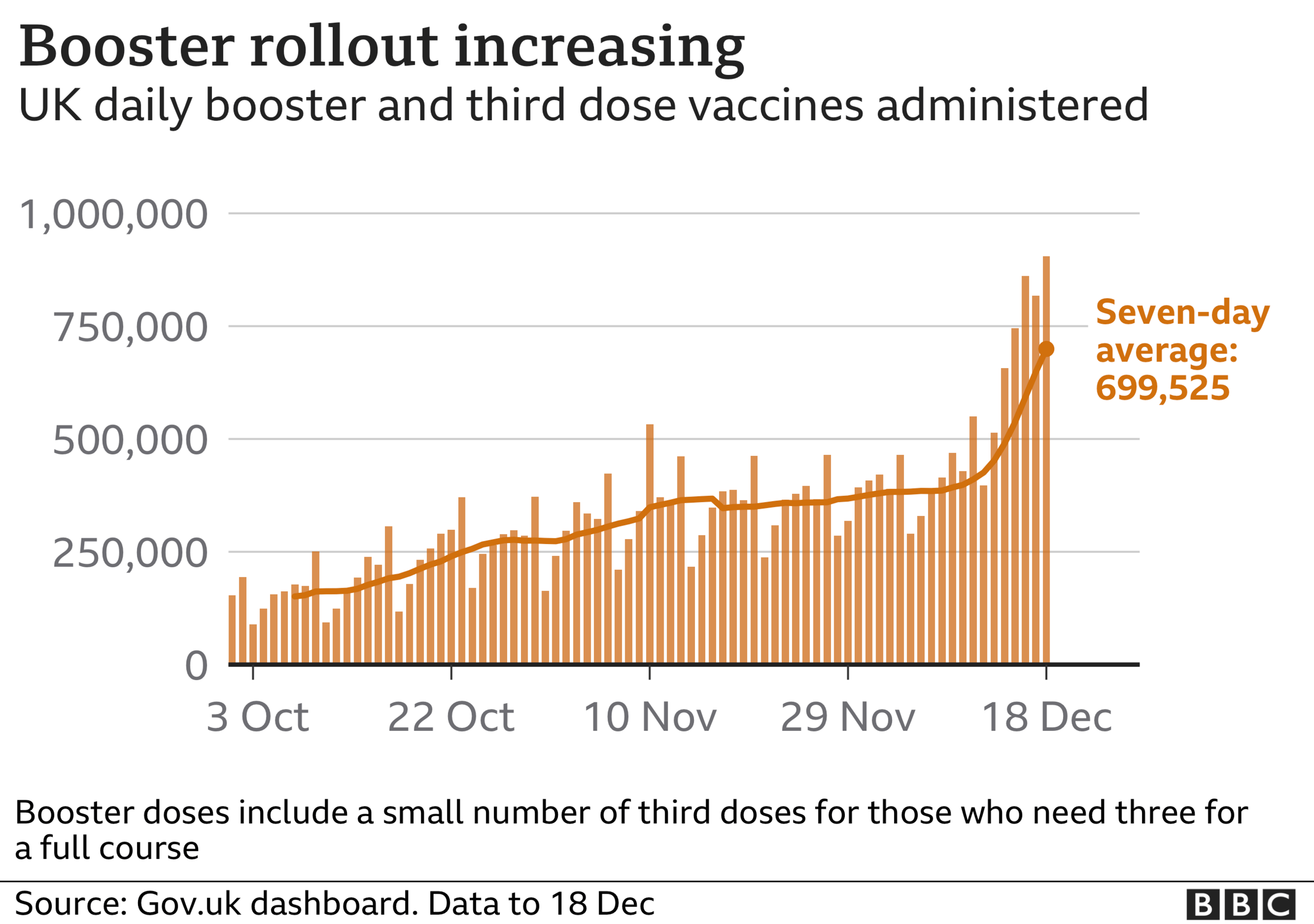Covid-19: Sajid Javid refuses to rule out more restrictions
- Published
Watch as the health secretary tells Andrew Marr he won't rule out bringing in tighter Covid measures
The health secretary has refused to rule out further Covid restrictions for England, as the Omicron variant spreads around the country.
A further 12,133 Omicron cases have been confirmed in the UK, although the true number is likely to be far higher.
Asked about possible new measures to slow the spread, Sajid Javid said there were "no guarantees in this pandemic".
The government and devolved leaders discussed the situation in a Cobra meeting on Sunday.
When it was suggested to him he was not ruling out a circuit-breaker - a short, sharp lockdown - or new restrictions before Christmas, Mr Javid told the BBC's Andrew Marr: "There are no guarantees in this pandemic, I don't think.
"At this point we just have to keep everything under review."
A further 82,886 daily Covid cases were reported across the UK on Sunday, after several days of record highs last week.

And leaked notes from the Scientific Advisory Group for Emergency (Sage) suggest that, without intervention beyond current Plan B rules in England, hospital admissions could reach 3,000 a day.
On those notes, Mr Javid said: "It's a very sobering analysis. We take it very seriously."
However, he added: "We do have to challenge data and underlying assumptions, I think that is appropriate, and take into account a broader set of facts."
Current Plan B rules for England include Covid passes for certain events, face masks in more places and people being urged to work from home if they can.
Other nations of the UK have similar rules - though Scotland has gone further by asking people to limit social contact to three households at a time in the run-up to Christmas, and could go further still in the new year.
Wales has also ordered nightclubs to close from 27 December.

Mayor of London Sadiq Khan told the BBC it was "inevitable" new coronavirus measures would be brought in for England.
"I think if we don't bring in new restrictions sooner rather than later, you're going to see even more positive cases and potentially public services like the NHS on the verge of collapse, if not collapsing," he said.
"I think we should be able to celebrate Christmas safely. But I think sooner rather than later we're going to look at social distancing, we're going to have to look at household mixing.
"If we don't, the number of cases is only going one way."

Speaking to Sky News, Mr Javid said ministers were monitoring the data and discussing it with scientists "almost on an hourly basis".
He confirmed that if new measures were to be proposed, Parliament would be recalled to approve them.
The health secretary's comments come exactly a year after Prime Minister Boris Johnson imposed Christmas restrictions on almost 18 million people across London and parts of England, in the face of the spread of the Alpha variant, which was first identified in Kent.
But Mr Javid said current factors, including vaccinations and antiviral medication, meant "the situation today in terms of our defences is very different".
He added, external that a record 906,656 vaccine doses were administered yesterday in England - including more than 830,000 boosters.
It means more than 27 million people in the UK have now had their third or booster dose.
Saturday's data - which included the second-highest number of cases since mass testing began last year - also saw another 125 deaths recorded within 28 days of a positive test, down slightly on a week ago.
The UK Health Security Agency said that, so far, seven people with Omicron have died in England.
The BBC's Laura Foster explains what a circuit breaker is and how it could help tackle Covid-19
While the devolved nations consider the possibility of further measures, a number of European countries are taking tough action - including limiting travel to and from the UK.
Both Germany and France have now banned arrivals from Britain - though there are exceptions for some groups.
And in the Netherlands, a strict lockdown has been announced, set to last until 14 January.


Introducing restrictions buys time, but it does not solve the problem.
The risk is you just delay the inevitable because you get a rebound in infections once they are lifted.
So the question that has to be asked is what will be done with the time that a short "circuit-breaker" would provide if it was introduced.
It would certainly allow more boosters to be done. But given more than 80% of the most vulnerable have been boosted the gains from that are nowhere near what they were for last winter's lockdown when the vaccine programme was in its infancy.
If admissions were to rise as quickly as some of the most pessimistic modelling suggests restrictions could stop the NHS being overwhelmed by flattening the peak.
This perhaps remains the strongest argument in favour of a circuit breaker given the uncertainty for the moment over how much serious illness will be caused by this Omicron wave.
And all of that, of course, needs to be weighed against the costs to society, the economy and wider mental health.

Brexit minister Lord Frost, meanwhile, has resigned from the UK government over "concerns about the current direction of travel".
In a letter to Mr Johnson, the peer, who led Brexit negotiations, said he hoped the PM would "not be tempted" by "coercive measures" to tackle Covid.
Asked about the resignation, Mr Javid said Lord Frost was an "outstanding public servant", telling the BBC that while he disagreed with his remarks, the minister had "resigned out of principle... and we have to respect that".

CHRISTMAS IN THE MIDDLE AGES: What were the festivities like for our ancestors?
HOW DO YOU REACT TO A BAD PRESENT? Hayley Pearce on the worst Christmas gifts she has received

- Published5 July 2023
